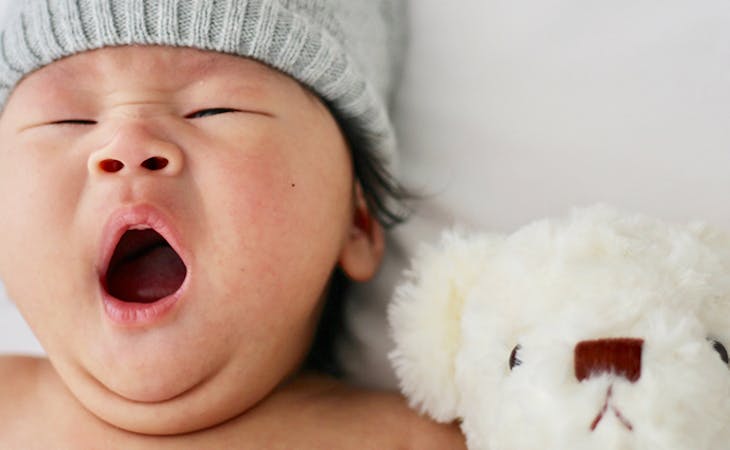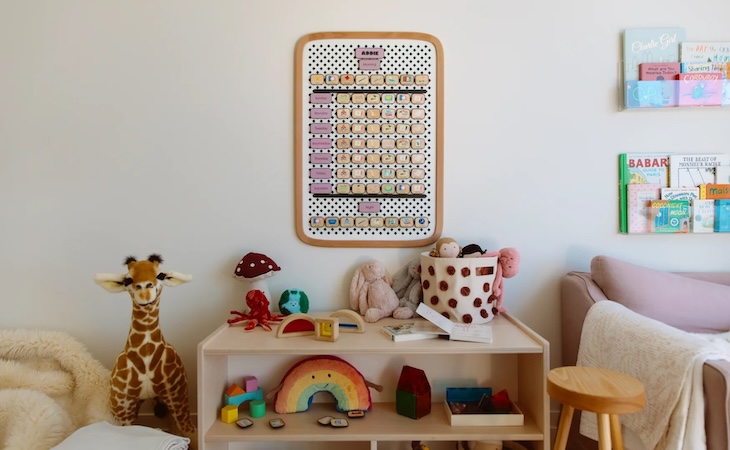First-time mom Kristina Jager of Juneau, Alaska, had been struggling for eight months to get her newborn daughter, Haddie Joe, to take daytime naps and sleep through the night.
“She was waking up every hour or two, six to eight times a night,” recalls Jager, who primarily relied on breastfeeding Haddie Joe until she nodded off. Sometimes her husband would give it a go, gently rocking or bottle-feeding the baby into the wee hours. Nothing worked.
Like most exhausted new parents, they read lots of parenting books, all suggesting different approaches. They researched parenting websites, poring over online advice. Still, nothing worked.
New parents and sleep deprivation
“One day, someone told me about Dana Obleman, the ‘Baby Sleep Boss,'” Jager says. After researching Obleman’s sleep-training methods, Jager bought the DIY resources to implement her step-by-step strategies. The result? By night five, Haddie Joe was sleeping through the night. Now 16 months old, she’s still a great sleeper, mom reports.
It’s no secret that new parents are pretty sleep-deprived. “Sleep deprivation is a huge issue for parents,” says Terry Cralle, RN, certified clinical sleep educator. And a lack of sleep puts parents’ health, safety, and wellbeing in jeopardy, she explains.
Cralle adds that it’s natural for babies to wake up periodically throughout the night and that you should avoid the urge to be too rigid in scheduling for the first six months. You definitely don’t want to attempt sleep-training methods before four months since babies aren’t born with established circadian rhythms, she says.
Once your child is of an appropriate age, sleep-training methods may help them—and you—sleep better. Some parents turn to a professional, like Obleman, for guidance in getting their children’s sleep habits on track. (Always check credentials and references, Cralle advises.) Since 2003, Obleman has helped over 57,000 parents with her quick, gentle solution to children’s sleep problems.
Here, we chat with the Baby Sleep Boss about what parents can do to help their babies sleep better.
Baby Sleep Boss Q&A
Q: What are the most common problems parents face when trying to get a baby to sleep?
As parents, we take it on as our job to get babies to sleep. That’s why we start rocking, feeding, and bouncing them to sleep. Then these little things we’re doing, which can be very helpful, start to become habits and props for the baby. The baby thinks, “This is the only way I can go to sleep, so please do this for me all night long.” That’s when it’s a problem—when parents start to feel like they have to rock or feed the baby to sleep. Parents need to course-correct and help this baby learn to fall asleep independently, without extra assistance.
Q: How do you know when a baby has sleep issues?
If you’ve got a baby who’s six months or older with multiple night wakings, you should look deeper, such as seeing if there’s a sleep-prop dependency.
Q: What do you mean?
We’re all very habitual about our sleep environments and the strategies we use to get ourselves to sleep. We sleep on the same side of the bed or use earplugs or need water by the bedside table. These strategies help us make that journey into sleep easier. With babies, they start making the journey with a sleep prop—something external. The most common sleep props are breast, bottle, or rocking. Every time baby has a nighttime wake-up, he needs you to recreate that situation that got him to sleep in the first place. This skill set (of getting oneself to sleep) doesn’t really become internalized. Instead, it’s dependent upon something else happening to get baby to sleep. This makes it troublesome for babies because, when their body is ready to sleep through the night, they can’t because they don’t know how.
Q: What can parents do to help their babies sleep better?
For starters, have a nap routine. Babies need to get enough daytime sleep. This depends on the child’s age, but learn about your baby’s awake windows. How much time awake can they tolerate? For a six-month-old, the threshold of being awake is about two and a half to three hours. Planning a nap schedule based on this helps your baby fall asleep when they’re fatigued but not overly fatigued. This will give you guidelines for when bedtime should be. Then, doing a relaxing bedtime routine—a bath, a massage, or reading stories together—is super important.
Next, monitor what the baby eats. They should get everything they need in a 12-hour day so they’re not hungry at night. If age-appropriate, have a feed in the sleep routine. Just make sure to keep baby awake so they’re not relying on feeding to get to sleep. Then put them in their crib awake.
Finally, eliminate props. Help your baby learn some independent ways of falling asleep that don’t involve you doing X, Y, or Z. For example, some babies don’t even know they need to lie down to sleep if they’re always put in the crib asleep. They need to find what works for them and practice this new skill. A newborn might play with their toes to feel calm or need to find a certain sleeping position that feels good. An older child, if age-appropriate, might use a stuffed toy.
Q: How would parents measure success with your method?
Quickly! By the third night, there’s often a significant improvement in how long it takes a baby to fall asleep and a decrease in nighttime wake-ups. By the end of the first week, you should have at least had one night where the baby slept consistently through the night.
Cralle notes how important it is for parents to prioritize sleep for everyone in the family. “That means enlisting help from others when possible, and that means employers accommodating sufficient sleep for all employees,” she says. “It also means helping babies and small children learn to fall asleep when age-appropriate, helping them develop good sleep habits early in life, and being a role model for children when it comes to sleep health.”
How can you tell if your child is getting enough shut-eye? Here’s how to spot the signs of sleep deprivation in children.




